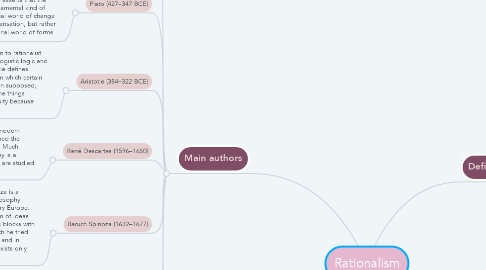
1. Main authors
1.1. Pythagoras (570–495 BCE)
1.1.1. Pythagoras was one of the first Western philosophers to stress rationalist insight. He is often revered as a great mathematician, mystic and scientist, but he is best known for the Pythagorean theorem, which bears his name, and for discovering the mathematical relationship between the length of strings on lute and the pitches of the notes.
1.2. Plato (427–347 BCE)
1.2.1. Plato held rational insight to a very high standard, as is seen in his works such as Meno and The Republic. He taught on the Theory of Forms which asserts that the highest and most fundamental kind of reality is not the material world of change known to us through sensation, but rather the abstract, non-material world of forms.
1.3. Aristotle (384–322 BCE)
1.3.1. Aristotle's main contribution to rationalist thinking was the use of syllogistic logic and its use in argument. Aristotle defines syllogism as "a discourse in which certain (specific) things having been supposed, something different from the things supposed results of necessity because these things are so."
1.4. René Descartes (1596–1650)
1.4.1. Descartes was the first of the modern rationalists and has been dubbed the 'Father of Modern Philosophy.' Much subsequent Western philosophy is a response to his writings, which are studied closely to this day.
1.5. Baruch Spinoza (1632–1677)
1.5.1. The philosophy of Baruch Spinoza is a systematic, logical, rational philosophy developed in seventeenth-century Europe. Spinoza's philosophy is a system of ideas constructed upon basic building blocks with an internal consistency with which he tried to answer life's major questions and in which he proposed that "God exists only philosophically."
1.6. Gottfried Leibniz (1646–1716)
1.6.1. Leibniz was the last major figure of seventeenth-century rationalism who contributed heavily to other fields such as metaphysics, epistemology, logic, mathematics, physics, jurisprudence, and the philosophy of religion; he is also considered to be one of the last "universal geniuses".
1.7. Immanuel Kant (1724–1804)
1.7.1. Kant is one of the central figures of modern philosophy, and set the terms by which all subsequent thinkers have had to grapple. He argued that human perception structures natural laws, and that reason is the source of morality. His thought continues to hold a major influence in contemporary thought, especially in fields such as metaphysics, epistemology, ethics, political philosophy, and aesthetics.
2. History
2.1. Epistemological rationalism in ancient philosophies
2.2. Epistemological rationalism in modern philosophies
2.3. Ethical rationalism
2.4. Religious rationalism
2.4.1. Expansion of religious rationalism
2.4.2. Four waves of religious rationalism
